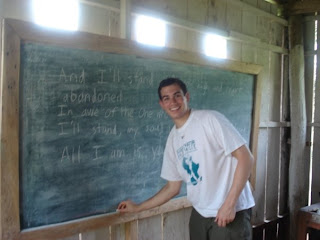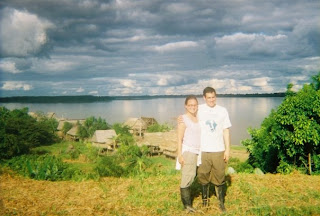At Nauta, we stepped into a stilted house to use a family's bathroom, a wooden toilet seat with a hole channeling to drop 20-30 feet to the ground below. We played with kids outside, imitating all the animals that we saw on Sunday, and then some.
 Tim Farmer does a great sloth, by the way. I jumped on the speedboat on the way to the village, one closer to Nauta than San Jorge.
Tim Farmer does a great sloth, by the way. I jumped on the speedboat on the way to the village, one closer to Nauta than San Jorge.Upon landing, I met Diana, an anthropology professor at GW, studying village life and working towards a tenure track. She chose to work here because the people were particularly friendly, organized, and open to having her. She explained that their basic needs of food and shelter are primarily taken care of by natural resources, but they have little money and need soap, vitamins, basic medicines, and fuel. They have no real savings and frequently lend goods to each other as needs arise, so banks are not used. There is a "Mother's Club" that provides goods to mothers in need, and communal work is common. The village governor guides activities, a pastor heads up a church, and a school teaches at both primary and secondary levels. The latter is very uncommon, and students come from other villages to go to this secondary school. The government does a decent job of supporting villages in times of need, and NGO's do even more.
Most villagers stay generally where they grow up, but some go to Nauta, fewer go to Iquitos, and a small minority leaves the area for good. Some young people join the military to see more of the world for a few years before coming back home. This village had historically been located across the Maranon, but moved due to severe flooding in the early 70's. The whole village just picked up and moved.


He thanked us for coming and asked if we knew any songs in English to make learning
 more fun. A minute later I was writing the chorus of "I'll Stand" by Hillsong United and "Better is One Day" on his blackboard, tuning up an old nylon string guitar, and singing praises in English with the students. Osmar came in to help explain the meaning and common mispronunciations.
more fun. A minute later I was writing the chorus of "I'll Stand" by Hillsong United and "Better is One Day" on his blackboard, tuning up an old nylon string guitar, and singing praises in English with the students. Osmar came in to help explain the meaning and common mispronunciations.I ate a butter and jam sandwich hastily as we began Tu Has Cambiado, then Shackles. We taught several students some of the moves and did it again. Then Mark intro'd Doors and gave the gospel presentation. Jenn and I talked to a few adults, including a teacher I had met earlier. They were very receptive and appreciative and prayed with us after we walked through the tracts. We encouraged them to start going to church to learn more, to which they earnestly agreed. The English teacher then took the mic and thanked us, in English, and said "thank you and goodbye," which sounded like he was awkwardly telling us to leave. He followed it with "for this moment," and a chuckle, and gave the mic back to Mark.
I then joined Osmar, Tim Farmer, and Carlos on the futbol pitch to challenge some youngsters, who played a very tight and clean game and left us sweating profusely in the tropical sun. We walked down the hill to help with food distribution, as the governor called family heads by name to come and pick up the packages we prepared.

Tim Farmer learned from our bus driver, who was not a Christian but wanted to see a village and the jungle, how to say "this is a gift from God," to the recipients lined up. Meanwhile, Laura, Jenn, Danielle, Juanita, and Catherine led the children through a craft, making mariposas (butterflies) of wooden clothespins, gold pipe cleaners, and bright tissue paper. The kids loved it.

We then donned our rubber boots and ventured into the jungle to pray for people that live here. The boots were required to protect us from snakes and parasites that can get through simple fabric. A few steps into our trek, we saw a speckled hawk swoop down and grab a snake off of the path. Our guide said the snake was one of the most poisonous around. We crossed over a large muddy pond on unstable logs and a handrail that fell off, up and down a hill to thickening brush. We saw colorful pointed flowers and a butterfly with a wingspan as broad as your extended thumb to pinky, shimmering bright blue as it reflected beams of light. We crossed several more streams, as we hoped no one would fall, but eventually Catherine lost her footing and tumbled into the water below.
 She was an incredible sport and kept on with the group despite her soaked feet.
She was an incredible sport and kept on with the group despite her soaked feet.We travelled through fields of flaming brush piles and climbed over downed trees to what our guide said was a waterfall, but translation was imperfect, and our destination was a bend in a 20 ft. wide river. Mark, Tim Farmer, and I travelled a bit further in total silence to try to immerse ourselves in undisturbed wild. Something large scampered off the path, and we soaked up the variety of plant and animal life. Monkeys and birds called out from above, although I could not distinguish which was which. Some local boys found bright orange huayuru seeds and gave them to us. We hurried back and got on the boat to travel home.


No comments:
Post a Comment